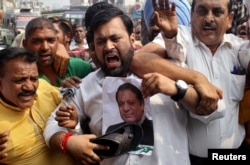Bangladesh pulled out of a regional summit to be held in Islamabad in November, a day after India announced that it would not attend the meeting in the aftermath of a deadly attack on an Indian army base close to Pakistan's border.
Without naming Pakistan, Junior Foreign Minister Shahriar Alam of Bangladesh said repeated interference in its internal affairs by one country had prompted Dhaka to pull out of the meeting of the South Asian Association of Regional Cooperation, or SAARC.
Indian media reported that Afghanistan and Bhutan have also said that they will not attend, but there was no confirmation from these countries.
The action is seen as an attempt to send a message to Pakistan about cross-border terrorism, not just in India but also in other countries in the region.
Blaming Pakistan-based Islamic militants for the assault on the army base that killed 18 soldiers, India has cited increasing cross-border attacks as its reason for staying away. Denying any responsibility, Islamabad has called the Indian allegations an attempt to deflect attention from the restive situation in Indian Kashmir.
South Asia expert Sukh Deo Muni, at the Indian Institute of Defense Analyses in New Delhi, said the pullout decision by India and Bangladesh, and likely also by Afghanistan and Bhutan, demonstrates that “Pakistan is at odds with other countries in South Asia besides India.”
He pointed out that while tensions between India and Pakistan spiraled recently, ties between Bangladesh and Islamabad have been frayed for a longer period. Their tensions stem from Islamabad’s criticism of the execution of Islamist leaders in Dhaka for alleged war crimes in the country’s 1971 War of Independence.
Responding to India’s decision to not attend the summit, Pakistan said on Tuesday that it remains committed to peace and regional cooperation and accused New Delhi of perpetrating terrorism on its soil.
SAARC, which was set up in 1985 to promote cooperation in what is one of the world’s least integrated regions, has been constantly overshadowed by the friction between its two biggest members – India and Pakistan.
The other countries in the eight-member group are Sri Lanka, Nepal and the Maldives.
Saying that the summit is now unlikely to take place, analyst Muni says the development represents a serious setback to efforts to promote trade and connectivity in South Asia.
Other analysts say India’s push for a boycott came as the government faces enormous domestic pressure to retaliate to the attack on the Indian army camp.
Manoj Joshi at the Observer Research Foundation in New Delhi says Indian Prime Minister Narendra Modi has opted for diplomatic measures. “People are angry and they want responses and I think it is better to make this move than to get into any kind of armed conflict,” says Joshi.





